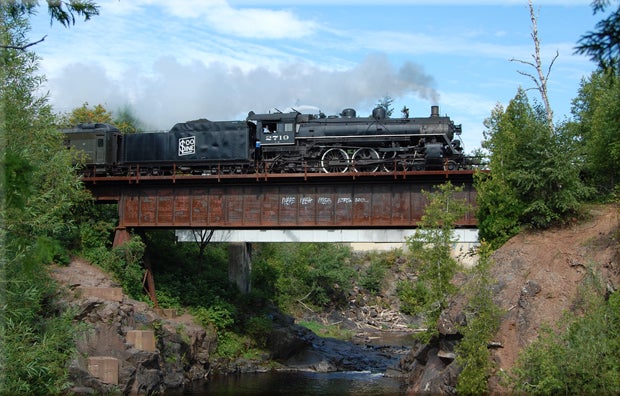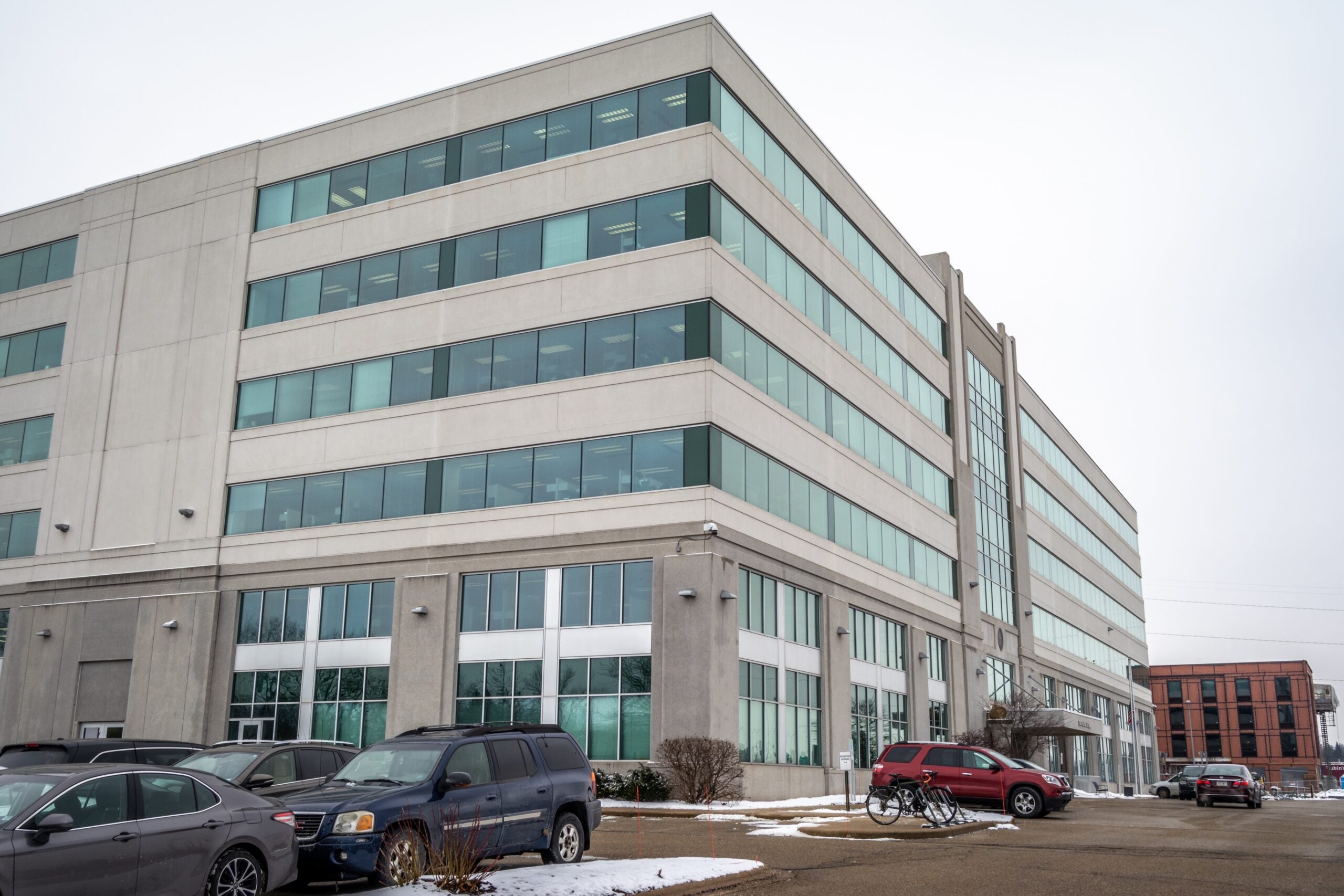Over the course of more than three decades, the Soo Line Locomotive No. 2719 traveled about 4 million miles on the Soo Line, hauling passengers across the Upper Midwest. But now, that train is at the center of a complicated tug of war between the city of Eau Claire and the Lake Superior Railroad Museum in Duluth.
One of only two of its series and class in existence, the 2719 moved to Eau Claire’s Carson Park in 1960 after being gifted to the city by the Soo Line Railroad. But after one relocation and a series of funding shortfalls, lack of shelter and good intentions to get the engine running, 2719 ended up at the Duluth museum in 2006.
Now, Eau Claire wants to buy the locomotive back through a clawback option it built into its sale to the museum in 2015, after a nine-year lease.
Stay informed on the latest news
Sign up for WPR’s email newsletter.
The Complicated Path The Locomotive Has Taken So Far:
1960: The 2719 was given to the city of Eau Claire and sat on display at Carson Park, a popular destination in the city.
1996: Local nonprofit Locomotive and Tower Preservation Fund forms and buys the engine from the city for $1. The engine is moved to a roundhouse in Altoona owned by the Union Pacific Railroad.
1998: The locomotive is brought back to life by the nonprofit.
2004: The Altoona roundhouse is demolished because of roof leakage and no desire by owners Union Pacific to fix it.
2006: The 2719 is moved to Duluth via rail in a slow and tedious process under an agreement between the city of Eau Claire and the museum.
2015: The boiler license for 2719 expires and the museum takes action to purchase the locomotive from the city. Eau Claire City Council takes back possession of the locomotive from the now defunct Locomotive and Tower Preservation Fund and sells the locomotive to the museum for $2, with an option to buy it back within three years.
A Future In Limbo
In June 2018, a month within that three-year deadline, Eau Claire City Council members voted to buy 2719 back from the museum for $4.
A fervent supporter of that move, then City Council Member Dave Strobel’s pitch began with an estimate that such an effort would cost about $35,000.
Strobel said he received that quote from a nearby railroad museum. After requests for proposals were sent out, the only legitimate bid was for $289,000. That’s only for moving the locomotive and doesn’t account for other associated costs, said Ken Buehler, executive director of the Lake Superior Railroad Museum.
After realizing that the cost to bring the locomotive to Eau Claire was exceedingly higher than anticipated, council members decided to pass another resolution in April 2019 acknowledging that moving the locomotive would be too expensive for the city. Instead, the City Council instructed its staff to look for long-term lease options with a “viable organization.”
The council is hopeful that the leasee will agree to terms such as making the train operational in three to five years and returning it to Eau Claire at the end of its operational life. If that’s not possible, the resolution says staff can issue nationwide requests for proposals for a long-term lease or sale.
The Duluth museum responded to that April resolution by giving Eau Claire until the end of next month to decide whether to sell the locomotive to the museum for $8 or risk more expensive alternatives, such as moving the locomotive off site.
Locomotive experts say that could cost the city more than $750,000, because it’s compounded by the fact that the engine can’t travel on rail without permission from the railroad, and the only other option would require disassembling it, trucking it, putting it back together and sheltering it — reasons why the council said no to moving it in the first place.
Buehler said the museum is interested in running the steam engine, which is sitting idle as it awaits a boiler inspection. Federal code requires boiler inspections to be completed every 15 years, and they can cost more than $100,000. The museum doesn’t want to heavily invest in the engine if it doesn’t own it.
Buehler said the museum wants to have at least one steam engine always in service. It’s already running the Duluth and Northeastern No. 28 steam engine. With the 2719 in operation, the museum will be able to swap one in while the other goes through a boiler inspection.

Soo Line 2719. Photo courtesy of the Lake Superior Railroad Museum
Now, the fate of the locomotive is in limbo, left to attorneys and others to come to a mutual agreement that the museum — which wants to buy the locomotive that’s sitting on its property — and the city — that doesn’t want to sell it — can agree to.
“Indiana Jones said it best in the ‘Last Crusade’ — ‘This belongs in a museum,’” Buehler said.
Eau Claire city attorney Steve Nick said Eau Claire has $100,000 set aside for relocation expenses in its 2019 capital improvement plan. There’s also potential for money to be pulled from the city’s contingency fund if needed.
“So far, no need has arisen as the city has not moved the train … instead, to date, the parties have focused on reaching a mutual solution,” Nick said.
Advocates for the locomotive returning to Eau Claire say it has historical significance and its presence is a tourist draw. Some, including former city councilman Strobel, agree that the engine should be back in Eau Claire because it was a gift.
Opponents such as Dave Peterson, of Eau Claire, who worked with the locomotive for 40 years and was part of the group that brought it into working order, say the engine should live where it has potential to run.
“There is no place in the country that people are taking functioning locomotives and putting them in a park,” Peterson said.
In addition to the custody battle over the locomotive, the Lake Superior Railroad Museum has assessed a fee of $100 a day to Eau Claire for cover and secure storage of the train — a fee that has amounted to about $35,000. The museum is also charging Eau Claire $1,300 for routine maintenance, Buehler said.
While Eau Claire has been receiving invoices for these dues, attorney Nick said the city has been advised by Buehler to hold off on payments until a solution is drawn up. Additionally, Nick said the city hasn’t agreed to the storage fees assessed by the museum.
Buehler said he didn’t expect the city to buy back the locomotive. Instead, he thought community members might get together to form a nonprofit to raise funds within those three years to bring the locomotive back to Eau Claire. That didn’t happen.
One of the reasons Buehler didn’t expect the city to buy 2719 back is because federal code says the owner of a steam locomotive is responsible for its operation. That means the city of Eau Claire and its taxpayers would be responsible.
“If they own it, we get it running and something happens, it’s the owner who’s on the line for that liability,” Buehler said. “And you can’t write that away by insurance.”
The city has a $10 million liability policy to protect itself and its engine.
Wisconsin Public Radio, © Copyright 2025, Board of Regents of the University of Wisconsin System and Wisconsin Educational Communications Board.




